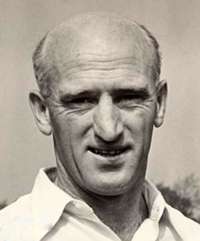Lawrie Miller
Lawrence Somerville Martin Miller (31 March 1923 – 17 December 1996) was a cricketer who played for Central Districts, Wellington and New Zealand.
 Lawrie Miller in 1958 | ||||||||||||||||||||||||||||||||||||||||
| Personal information | ||||||||||||||||||||||||||||||||||||||||
|---|---|---|---|---|---|---|---|---|---|---|---|---|---|---|---|---|---|---|---|---|---|---|---|---|---|---|---|---|---|---|---|---|---|---|---|---|---|---|---|---|
| Born | 31 March 1923 New Plymouth, Taranaki, New Zealand | |||||||||||||||||||||||||||||||||||||||
| Died | 17 December 1996 (aged 73) Wellington, New Zealand | |||||||||||||||||||||||||||||||||||||||
| Batting | Left-hand bat | |||||||||||||||||||||||||||||||||||||||
| Bowling | Left-arm slow-medium | |||||||||||||||||||||||||||||||||||||||
| International information | ||||||||||||||||||||||||||||||||||||||||
| National side |
| |||||||||||||||||||||||||||||||||||||||
| Test debut (cap 60) | 6 March 1953 v South Africa | |||||||||||||||||||||||||||||||||||||||
| Last Test | 21 August 1958 v England | |||||||||||||||||||||||||||||||||||||||
| Career statistics | ||||||||||||||||||||||||||||||||||||||||
| ||||||||||||||||||||||||||||||||||||||||
Source: Cricinfo, 1 April 2017 | ||||||||||||||||||||||||||||||||||||||||
Cricket career
A tall left-handed batsman, Miller was a late developer who made his first class debut at 27 when Central Districts entered the Plunket Shield for the 1950–51 season. Batting in the middle order he top-scored in the first match with 46, and again in the second match with 64, when Central Districts had their first victory. He did not play in 1951–52, but returned in force in 1952–53: 103 not out against Wellington, 128 not out and 89 not out against Canterbury, 77 and 31 against Otago, and 43 against Auckland, amassing 471 runs at 157.00.
He played in the two Tests later that season against South Africa, making 17, 13 and 44, and was selected to tour South Africa in 1953–54. He failed there though, making only 47 runs in four Tests including four successive ducks. In the Second Test at Johannesburg he was felled by a sharply rising ball from Neil Adcock that struck him over the heart, and was taken to hospital. Although he was not expected to bat again in the innings, he returned to the crease straight from hospital at the fall of the fifth wicket and resisted the bowling for another half-hour.[1] After the tour he found belated form in Australia on the way home, scoring 142 against South Australia and 60 against Victoria.
His highest Test score was 47 (followed by 25 in the second innings) when he opened the batting in a low-scoring game against West Indies at Auckland in 1955–56, and New Zealand finally won a Test match after 26 years of trying.[2] He had hit his highest first-class score earlier that season, 144 against Auckland, as well as scoring 114 for Wellington against the West Indians, having begun playing for Wellington the previous season.
Although he played 13 Tests over five years, he made little impact, never passing 50 in an innings, and averaging less than 14 runs per innings. His Test career ended after the damp series in England in 1958, when he completed 1148 runs in first-class matches but again failed in the Tests. Wisden said that "at the age of 35, [he] came too late on his first tour of England ... he knew how to punish the loose ball, but he was not happy against bowling of the highest class."[3]
He was one of the leading batsmen in the Plunket Shield in the 1950s: he scored 661 runs at an average of 66.10 for Central Districts, and 1708 runs at 47.44 for Wellington.[4] He won the Redpath Cup for New Zealand batsman of the season in 1952-53, 1956-57 and 1957-58.[5]
References
- Richard Boock, The Last Everyday Hero, Longacre, Auckland, 2012, pp. 19–20.
- "New Zealand vs West Indies 4th Test 1956 - Score Report". ESPNcricinfo. Retrieved 23 May 2019.
- Wisden 1959, p. 227.
- "First-class Batting and Fielding For Each Team by Lawrie Miller". CricketArchive. Retrieved 9 August 2018.
- "Redpath Cup (Men's Batting)". New Zealand Cricket Museum. Retrieved 25 September 2019.